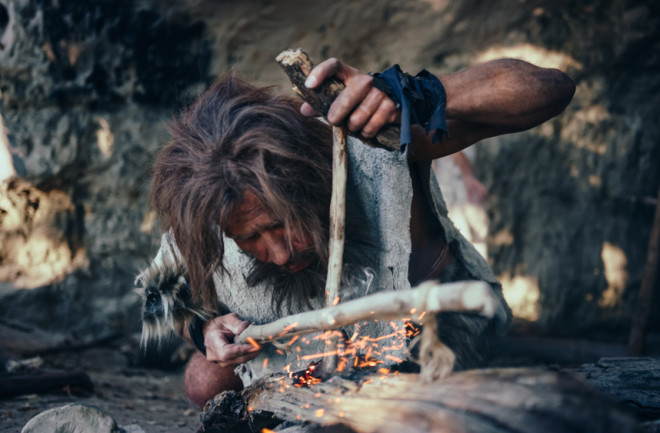Anyone who has ever tried to start a campfire knows it’s not that easy — even with matches. A person has to get the right kindling and tinder, place the match in a suitable spot, and nurture the flame so it spreads. It’s no wonder different scouting groups award merit badges to campers who successfully foster the flames.
It took a long time for ancient humans to master fire-making and adapt it to daily life. But once fire became a consistent tool, it changed many aspects of early human civilization.
How Humans Found Fire
Cartoons always depict cavemen having an epiphany in which they discover the wheel or start a fire for the first time. But there wasn’t just one moment when a caveman picked up a hunk of pyrite, struck it against a rock, and marveled at the resulting sparks. Instead, hominins lived with natural fire long before they were able to replicate and control it.
“At that period, they started to conceptualize fire and understand that stuff tastes better when it’s not raw,” says Francesco Berna, a professor of archaeology at Simon Fraser University in Burnaby, British Columbia, who studies the archeology of fire.
When Was Fire Invented?
So it wasn’t that fire was invented and spread like, well... wildfire. It’s more that humans lived with natural fire, developed tools for controlling flames, and adapted those tools over time.
There’s archeological evidence that archaic humans used fire sporadically as far back as 1.6 million years ago. But it wasn’t until around 350,000 years ago that fire was widely used, with archeological sites from that time being the first to reveal consistent evidence of fire. It was then that spark turned to flame: From then on, fire would play an essential part in human history.
Read More: The Dawn of Fire: When Did Early Humans First Discover Fire?What Did Fire Mean To Early Humans?
What Did Fire Mean To Early Humans?
Although humans have long had access to fire, scientists have only shown greater interest in the archeology of fire in the past few decades.
Archeologists now debate whether Homo sapiens evolved from earlier hominins thanks to the adaptation of fire and the improvements it brought to their diet, shelter, and daily well-being.
But they do agree that once fire was widely adapted, archaic humans benefited from advantages their own ancestors did not.
Read More: Fire May Have Provided Humanity's First Social Spark
How Fire Changed Ancient Life
Fire brought many changes to daily life. It allowed people to occupy dark spaces such as caves and to stay safe from predators in open areas such as savannas.
Bonfires also brought more than light and warmth into the night. They attracted people and allowed for bonding and language development, as well. “It was very important as a social aggregator,” Berna says.
And though ancient people didn’t build s’mores around their campfires, the adaptation of fire also changed their ability to acquire food.
Fire and Early Farming
Before farming, archaic humans “managed landscapes,” using fire to manipulate the terrain and remove wooded areas. Reducing tall trees allowed more sunlight, Berna says, which encouraged the growth of the desired plants for foraging.
As humans became farmers, fire also helped develop land for planting. “There were some early farmers that would use slash and burn,” Berna adds. “They would grow crops in previously forested areas.”
Fire and Early Hunting
Of course, the benefits of fire weren’t limited to foraging. Scientists currently have several ideas on how they think fire helped archaic humans hunt.
“There are some hypotheses, and you can see some depictions of Neanderthals or Homo sapiens with a torch and pushing big game into traps, jumps, or mud. That may be one way,” Berna says. “Most animals are afraid of fire.”
But he thinks it’s more likely that early humans used fire to modify the landscape so it was easier to hunt. “By burning down tall grass, you can have better vision,” he adds.
Not only that, hunters and gatherers used fires to stop grasslands from becoming too overgrown, allowing them to attract the animals they wanted to eat. It’s also possible that flames helped humans remove foliage that wasn't desirable to their selected prey, Berna says, increasing the presence of plants that their target species preferred.
Fire and Ancient Burial Practices
Adapting fire changed how early humans lived, and in some ways, it changed how they treated their dead. As many people transitioned from nomadic to agrarian lifestyles, how they viewed death and buried their dead also changed.
The earliest evidence of cremation dates back to 40,000 years ago in Australia. However, Berna says scientists do not know whether those cremations were intentional or accidental. And if they were intentional, archeologists aren’t sure what meaning cremation had to early humans. “What did they think cremation was? Was it just burning a body to remove the flesh? Or to transform the body into ashes?” he says.
Consistent evidence of cremation doesn’t occur until relatively late in human history — around the time that humans stopped being nomadic.
Berna says that archeologists have identified intentional burn pits from around 10000 B.C.E to 8000 B.C.E. that were filled with ash and likely served as a village crematorium.
“Cremation is kind of recent human history,” Berna says.
Read More: Archaeologists Find Earliest Evidence of Humans Cooking With Fire
Article Sources
Our writers at Discovermagazine.com use peer-reviewed studies and high-quality sources for our articles, and our editors review for scientific accuracy and editorial standards. Review the sources used below for this article:
Astrophysics Data System. Understanding environmental impacts of prehistoric fire
The University of Chicago Press Journals. Fire and the Genus Homo

